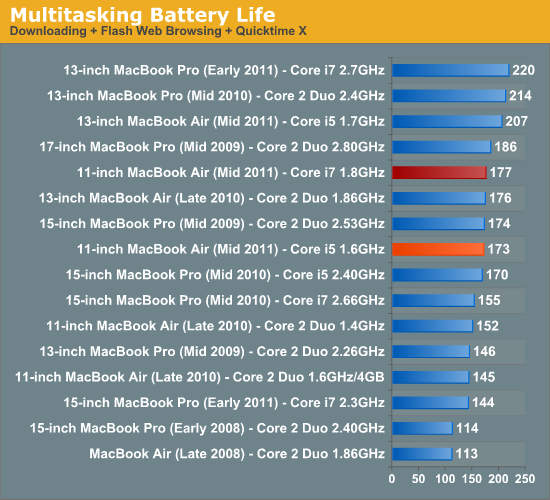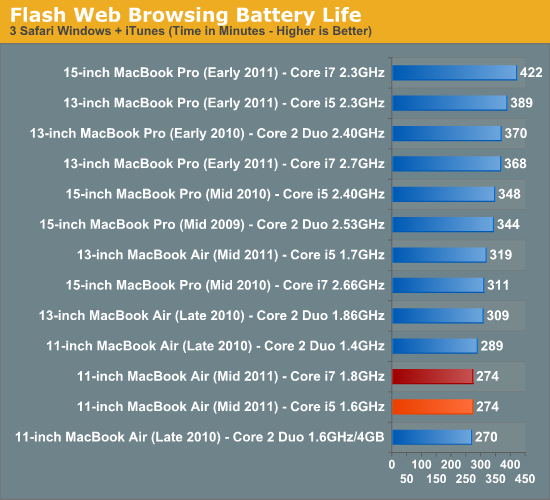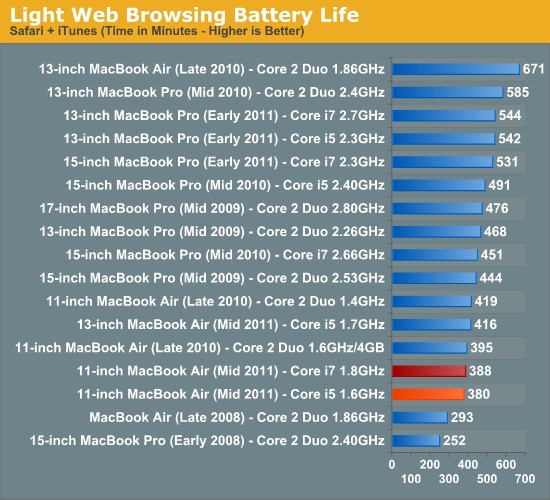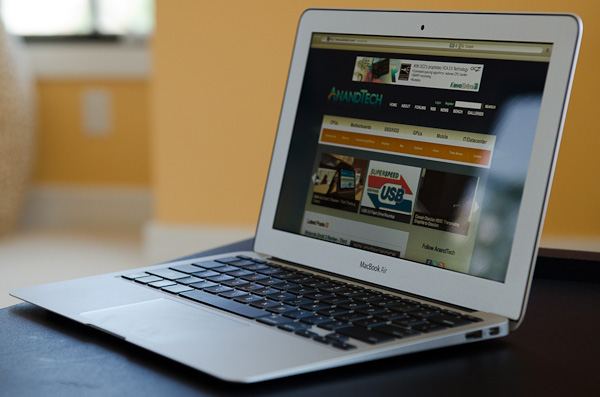Apple's 11-inch MacBook Air (Core i7 1.8GHz) Review Update
by Anand Lal Shimpi on August 1, 2011 6:08 PM EST- Posted in
- Mac
- Apple
- Intel
- Core i7
- Sandy Bridge
- MacBook Air
Battery Life
The 1.8GHz Core i7 doesn't run much faster by default than the 1.6GHz Core i5, but it can turbo up to a 25% higher clock speed than the Core i5. What's the impact on battery life?
If you're running a high CPU workload that never lets up in a continuous loop, the i7 is going to die quicker than the i5. Active power is greater at higher frequencies (assuming everything else remains the same) and with no chance to get to sleep the i7 will eat through the 35Wh battery faster than the i5.
Where the i7 stands a chance however is in workloads where you aren't running the CPU at full tilt all of the time. The i7 needs tiny, tiny, tiny fractions of a second of idle time to throttle down and go to sleep. It's in these sleep states that it'll draw very little power and avoid being a major consumer of that 35Wh (or 50Wh in the 13) battery. From the CPU's perspective, it wants to finish its work as quickly as possible so it can get back into its really low power idle states.
For workloads with balanced periods of load and idle time, the i7 should be able to at least equal the battery life of the i5. Short bursts of instructions can execute up to 25% faster on the i7, allowing it to go back to sleep that much quicker. Any energy expended from running at higher clock could be saved by spending more time at idle.
The other advantage is the larger L3 cache. A larger cache means a higher likelihood of finding data in that cache, which saves trips to main memory. Anytime you go off-chip for data the power penalty is tremendous. You have to fire up a powerful memory interface, drive requests back and forth over a high speed bus and actually pull the data from DRAM. The entire process is far more power intensive than just grabbing data from the CPU's on-die L3 cache. I wouldn't expect huge power savings from the L3 cache, but it's likely a net positive.
Our battery life tests are designed to run the gamut. Showing you the absolute best case use-your-notebook-as-a-typewriter light web browsing test to the get-stuff-done multitasking workload. I'd say most power users will see battery life similar to the worst case scenario, while mainstream users will be between that and the flash web browsing test. The writers in the crowd can shoot for the battery life in our lightest scenario if you really just spend your time in TextEdit.
All of our tests were run with dynamic brightness control disabled (panel brightness near 50% - we tried to equalize brightness across all systems) and the Macs were set to never go to sleep.
As you can see by the numbers below, there's basically no impact on battery life from the i7 upgrade. Note that none of these workloads keep the CPU pegged at 100% throughout the test. As I mentioned earlier, if you're going to be doing a long 3D render or compiling a very large project (multiple hours) you can expect worse battery life from the i7. Typical notebook usage models however shouldn't see much of a difference at all.
Multitasking Battery Life
In this test we have three open Safari windows, each browsing a set of web pages with between 1—4 flash ads per page, at the same time. We're also playing an XviD video in a window all while downloading files from a server at 500KB/s.

Flash Web Browsing
The test here has three Safari windows open, each browsing a set of web pages with between 1—4 animated flash ads per page, at the same time. Each page forwards onto the next after about 20 seconds.

Light Web Browsing
Here we're simply listening to MP3s in iTunes on repeat while browsing through a series of webpages with no flash on them. Each page forwards on to the next in the series after 20 seconds.












55 Comments
View All Comments
jnmfox - Monday, August 1, 2011 - link
"If you're buying an 11-inch MacBook Pro and care about performance, the 1.8GHz CPU upgrade is worth it."An 11-inch MBP could be sweet though....
CharonPDX - Monday, August 1, 2011 - link
For $50, you get an 11" that is faster than the base 13", and you're giving up an SD slot and some resolution, in favor of a smaller/lighter chassis and better performance.To me, it's a no-brainer. If I were in the market to replace my notebook right now (aka: if my MacBook Pro were to die in the next couple months,) I would immediately get an 11" Air upgraded to i7.
h00ligan76 - Monday, August 1, 2011 - link
You also give up battery life, and that screen space is palpable to some. Anyone needing photo editing on the go is going to benefit from added screen, sd (potentially) and battery life...I agree for some it's a no brainer.. just which way depends on the person :)
vrusso87 - Monday, August 1, 2011 - link
I was just at the web store and noticed something characteristically Apple - you can't upgrade the base 11-inch (64GB) or 13-inch (128GB) Air models to the i7. You have to swallow the $200-$300 price premium for the larger SSD before you can shell out another $100-$150 for the i7.Irksome.
blue_fireball_eater - Monday, August 1, 2011 - link
Is how fast the OWC Aura drive run in these machines. I have the Samsung drive, so should I even consider upgrading to a Sandforce drive, or just wait for inevitable Sandforce 2000 version to come out?tipoo - Monday, August 1, 2011 - link
I'd still like to see decible readings of these at load, I see them in other Anandtech laptop reviews but for some reason never on Mac's.aladdin68 - Monday, August 1, 2011 - link
does the fact that the 11 in i7's run a little hotter likely to have any impact on their overall lifespan as compared to the 11 in i5's?narlzac85 - Monday, August 1, 2011 - link
I wish there was a comparison review of the base $999 model, because I think a lot of people are going to buy that one not realizing that they are only getting 2GB of memory and its not able to be upgraded. Which to me would seem like buying a completely crippled system. Wasn't 2GB determined to be the absolute minimum for OSX way back in Leopard? Bad move by Apple. They should have ditched thunderbolt on the base model and increased the memory. Considering more ram benefits everyone and thunderbolt benefits very few people at the moment. Or they could have just eaten the cost of the 2 extra GB if they are really trying to push Thunderbolt.h00ligan76 - Monday, August 1, 2011 - link
My air boots requiring 1.25 GB - before running anything. It starts paging pretty fast even with 4gb the minute lightroom and photoshop get opened.At this point, for anything other than an iPad with a keyboard, I wouldn't be buying the 2gb model.
hechacker1 - Tuesday, August 2, 2011 - link
I too noticed as soon as I upgraded to Lion, even with 4GB it started to swap out to disk.I'm assuming they changed the memory management in Lion compared to Snow Leopard, because it rarely swapped in SL.
So I went out to buy 8GB, and now it doesn't swap. But it does somehow consume 7.5GB with what I assume are caches (even when I'm not running lots of programs).